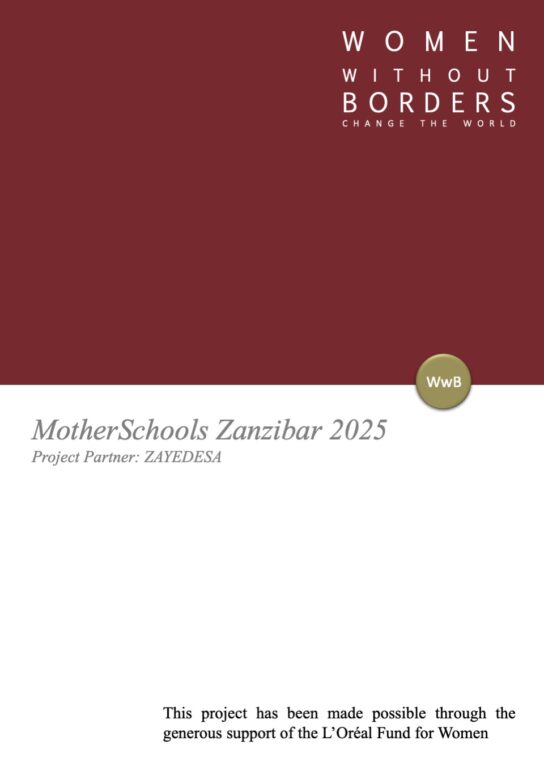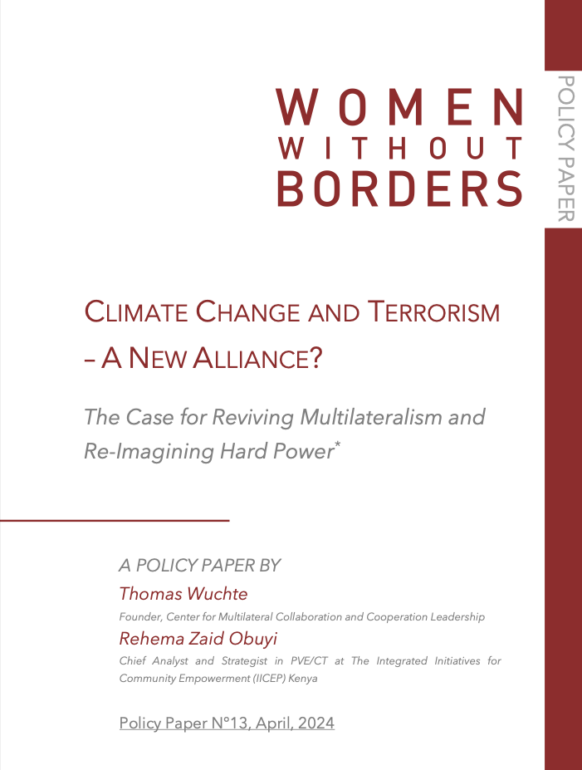Between 2021-2024, WwB implemented its ‘MotherSchools: Parenting for Peace’ Model in Zanzibar with its local partner ZAYEDESA. The programme in Zanzibar, which is part of a multi-country project supported by the L’Oréal Fund for Women, saw 23 groups convene over the course of 4 years across 7 districts. This impact report offers an overview of the MotherSchools project in Zanzibar, introduces WwB’s impact model, and presents the impact findings based on quantitative and qualitative data from the perspectives of project stakeholders, including Participants, Teachers, and Notetakers.
Considering the growing presence of terrorist organisations like al-Qaeda and al-Shabaab in neighbouring countries, concerns are rising about the spread of violent extremism in Tanzania. Research suggests that their main aim in Zanzibar is recruiting new members. However, only a few information sources can be found on al-Qaeda’s activities in Tanzania, let alone Zanzibar. It can be assumed that these organisations are not completely inactive in those countries. Looking at the latest figures on terrorist activities in Zanzibar and Tanzania, no acute danger can be identified. However, following the views of most reports on this topic, a growing potential for radicalisation tendencies can be recognised. The economic, socio-cultural, and political conditions serve as a basis for extremist ideas. In terms of the profiles of the people who are recruited, they are predominantly young men who hope to find a way out of their discontented situation through more radical Islamist thought. Lately there have been reports on young men disappearing from the island and showing up on Tanzania mainland, allegedly joining jihad. The young men are approached by recruiters at their hangouts, trying to lure them into their beliefs. Although their families report about certain patterns of change they witness in their sons or husbands, they are still unable to prevent their leaving. Violent extremism is reluctantly addressed in Tanzania, as the country maintains a culture of concealment by government restraint and a certain level of censorship of the media. As a result and due to the lack of trust the population has in the police, communities are also reluctant to raise awareness of violent extremism in their neighbourhoods.
“Most of [the young people], they engage in drugs. After engag[ing] in drugs, then they start killing. They start doing those violence, raping, killing, but most of them when they were in young age, they tried to do to engage themselves in drugs. So if you engage in drugs, means you can do anything. You can steal, you can rape, you can kill, you can do violence. And if someone asking you to do this, if he pays you, of course you can do it. As long as life goes on.”
– MotherSchools Notetaker, Zanzibar 2021
“I think extremism is highly practiced in Zanzibar. In 2013, a priest was murdered here in Zanzibar and another one was shot but survived. But the government does not accept the reality that there is extremism in Zanzibar. They just think it is a form of violence. I face the discrimination. I hope we can bring changes. You cannot speak about these issues because you will get trouble from the people.”
– MotherSchools Notetaker, Zanzibar 2021
“I think [poverty] is the main [threat for young people in Zanzibar]. With that poverty, people look for solutions, and sometimes when you look for solutions, you go the wrong way.”
– MotherSchools Teacher, Zanzibar 2021
Executive Summary: Participant Perspectives
Below is an overview of some of the key findings from the perspective of the Participants who went through the programme, receiving approximately 40 hours of training in PVE (preventing violent extremism), childhood development, security, peacebuilding, and communications.
Confidence | Participants were previously afraid to solve their hardships inside the domestic walls and to fight for their voice to be heard and respected. After attending MotherSchools, Participants express great pride in how they are now able to recognise the strength and power they hold and use it to take action in their lives.
Competence in Parenting | Participants felt a disconnect in their families and did not know how to improve relations. After MotherSchools, Participants express a greater understanding in their role as a mother, and they have observed positive changes and improved family dynamics.
Competence in Preventing Drivers to Violence and Extremism | Participants previously did not view violence and extremism as prevalent issues within their communities. After learning more about these topics in MotherSchools, they are now much more aware of the threats and express an ability to recognise the warning signs and spread awareness to others.
Applying the Knowledge | Participants’ parenting was previously shaped by anxiety and anger, which affected their family relations. During the sessions, they gained practical tactics for supporting their children and preventing them from engaging in harmful activities or groups. They have begun applying these methods and are noticing positive changes in their children.
Breaking the Silence | Participants were previously inclined to keep their problems to themselves. During MotherSchools, they learned about the importance of opening up about their concerns and fears. Not only did they start voicing their struggles and opinions, but they also vowed to take their voices back into their communities and start conversations around difficult topics, such as extremism and violence.
Leadership | Previously, Participants did not feel their opinions were desired or valued, and therefore saw little reason to share them. After the MotherSchools sessions, they articulated feeling empowered as role models and advocates, gaining greater respect and inclusion in decision-making within their families and communities.
Trust | Prior to MotherSchools, Participants did not feel they had people they could trust and turn to in difficult situations. Their MotherSchools groups soon became a place in which they felt comfortable openly sharing their concerns, knowing they would receive trustworthy advice and support from the other Participants.
Norms | Participants had faced challenges in having open conversations with their husbands and children. Following MotherSchools, they are making a point of improving communication with their family – standing up for themselves, and ensuring their opinions are heard and respected.
Networks | Participants had previously lacked a network of people they could turn to. After forming a strong bond through MotherSchools, they proudly shared that they are still in contact with each other. They have will continue to organise meetings and call each other regularly.
To read more on the impact of MotherSchools Zanzibar 2021-2024, read the full report.



